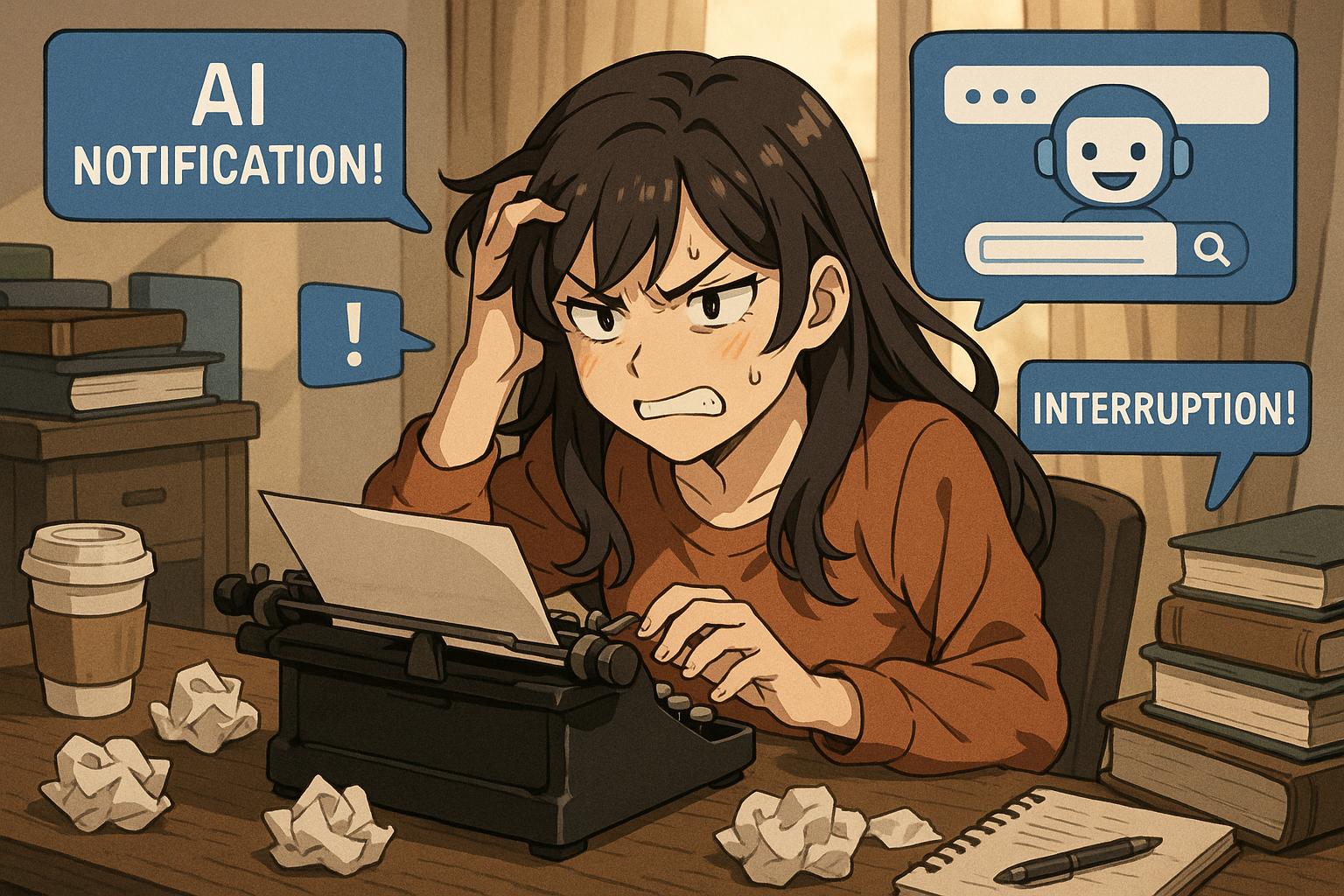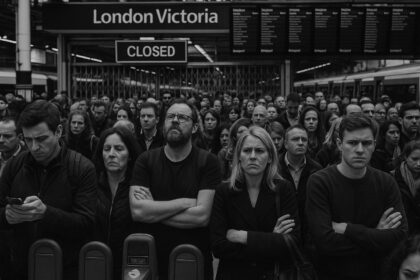As AI tools become increasingly embedded in writing, authors face mounting challenges from intrusive interruptions and copyright concerns, sparking industry-wide debates and landmark agreements to protect creative integrity.
We find ourselves increasingly entwined with the concept of artificial intelligence, a burgeoning technology that simultaneously promises ease and evokes frustration in our everyday lives. For writers, who traditionally rely on the flow of human creativity, the integration of AI into their processes can feel more like a disruption than a boon. Such is the case for one novelist grappling with the challenges presented by AI tools while drafting a memoir.
In her everyday writing experience, Mary Ann—whose romance novels resonate with an audience of busy professionals—encountered a startling reality while utilising an AI application for assistance. While she appreciated the program’s corrections for her frequent typos, it was the incessant interruptions that truly vexed her. As her thoughts flowed less like a steady river and more like a dammed stream, she found herself pleading with her AI program to “stop,” only to be faced with unsolicited notifications and intrusive prompts. The frustration heightened as reminders from her virtual assistant, Alexa, and incessant suggestions from the AI tool stripped her of the focus necessary for creative writing.
This anecdote embodies a broader narrative within the publishing industry, as authors and professionals navigate the juxtaposition of AI’s potential and its pitfalls. The rise of generative AI technologies stirs a potent mix of opportunity and concern, especially regarding their impact on authorship and copyright. With new models often trained on openly available written works—including those protected by copyright—authors’ organisations are pushing for clearer contractual agreements to safeguard their intellectual property. As reported, the Authors Guild and literary agents are advocating for enhanced protections even as publishers experiment with AI’s capabilities, striving to strike a balance between innovation and ethical standards.
While some view AI as a valuable tool that could alleviate the burdens on writers, critics argue that its involvement undermines the very essence of creative writing. This debate has intensified as organisations like NaNoWriMo take a neutral stance on the use of AI in writing, resulting in backlash from those who believe that reliance on AI erodes the creative rigour required to develop one’s craft. There is an argument to be made that in focusing on productivity with the help of AI, particularly for those who face barriers in writing, the industry risks valuing expediency over genuine artistic expression.
In a parallel narrative, the recent strike by the Writers Guild of America reflects the growing concerns over AI encroachment in creative spaces. Following a 148-day standoff, screenwriters successfully negotiated protections against the use of AI in scriptwriting, ensuring transparency in any AI-generated content involved in their work. This landmark victory signals a profound shift, one that prioritises the rights of human authors while drawing clear lines around the use of AI in the writing process. The agreement disallows AI from being credited in creative works and establishes stringent guidelines that are a testament to writers’ growing apprehension toward AI’s potential usurpation of their roles.
Meanwhile, in the world of speculative fiction, the editor of Clarkesworld magazine, Neil Clarke, recently faced a puzzling dilemma due to an overwhelming influx of AI-generated submissions. This phenomenon, driven by the accessibility of tools like ChatGPT, led Clarke to suspend new pitches temporarily, underscoring the concerns about authenticity and originality within publishing. Such challenges resonate throughout various genres, where questions of AI’s influence threaten to undermine the very fabric of creativity.
As technology continues to evolve, it becomes imperative to reflect on its implications for society. For many writers, the internal struggle between using AI as a supportive tool versus allowing it to overshadow their creative instincts is a poignant concern. Mary Ann’s experiences poignantly illustrate the hurdles faced by writers as they navigate this delicate balance. Amid the cacophony of notifications and AI interventions, the essential question remains: how can writers reclaim their narrative in a world increasingly driven by algorithms?
Sher Davidson’s reflections encourage us to engage with these complexities further. As AI evolves, so too must our discussions and safeguards around it, ensuring that it enhances rather than disrupts the artistry inherent in writing. Ultimately, the goal should not only be to adapt to technological advancements but to harness them in a manner that respects and nurtures the unique human touch in storytelling.
Reference Map
- Paragraph 1: (1)
- Paragraph 2: (1), (2)
- Paragraph 3: (2), (3)
- Paragraph 4: (4)
- Paragraph 5: (5)
- Paragraph 6: (6)
- Paragraph 7: (1)
Source: Noah Wire Services
- https://lakeoswegoreview.com/2025/05/22/jottings-from-fifth-g-tangle-or-tango-with-ai/ – Please view link – unable to able to access data
- https://www.ft.com/content/44d530bc-a710-4705-be3a-9d11bc23b131 – The publishing industry is grappling with the implications of generative AI technologies, facing both opportunities and significant challenges. Authors and industry professionals express deep concerns over AI-generated content replacing human authorship, especially when AI models are trained on copyrighted materials without consent. The Authors Guild and literary agents are pushing for new contractual clauses to protect authors’ intellectual property, while publishers explore AI’s capacity to support innovation. Despite experimentation, the publishing industry is cautious, emphasizing oversight and ethical standards.
- https://www.theatlantic.com/books/archive/2024/09/ai-is-coming-for-the-amateur-novelists-thats-fine/679696/?utm_source=apple_news – NaNoWriMo’s recent neutral stance on AI usage in writing has sparked controversy. Critics argue that AI’s involvement undermines the creativity and challenging nature of novel writing. Proponents believe AI can assist those with less privilege or disabilities. Despite the backlash, the author suggests that AI can alleviate the pressure of producing numerous low-quality novels quickly, leaving human authors to focus on the thoughtful and creative aspects of writing. Ultimately, writing is a skill developed through patience and effort, and AI’s role in this space remains contentious.
- https://apnews.com/article/39ab72582c3a15f77510c9c30a45ffc8 – Hollywood screenwriters concluded a 148-day strike, achieving pivotal protections against the use of AI in scriptwriting, marking a significant labor victory in the early confrontations over AI’s role in workplaces. The Writers Guild of America (WGA) negotiated enforcements that studios disclose AI-generated content used in scripts, and explicitly stated that AI cannot be credited, write, or rewrite literary material. AI content is also barred from affecting writer’s credits or their rights. The agreement allows AI use only with company consent and prohibits mandatory AI use by writers.
- https://time.com/6257471/clarkesworld-ai-science-fiction/ – The editor-in-chief of Clarkesworld magazine, Neil Clarke, announced the temporary halt of submissions due to a surge of AI-generated pitches. The magazine, which publishes science fiction stories, has seen an influx of submissions using AI-generated content, especially with the rise of tools like ChatGPT launched by OpenAI. Clarke noted that while genuine pitches are being submitted, many lack originality and are driven by opportunists seeking profit. The prevalence of such submissions poses a significant burden, particularly as Sci-Fi publishers uphold higher payment standards per word than other genres.
- https://time.com/7026050/chatgpt-quit-teaching-ai-essay/ – After nearly 20 years of teaching, I quit my role as a university educator due to the impact of large language models like ChatGPT on the learning process. Writing, an integral part of critical thinking and intellectual development, is often bypassed by students using AI tools. Despite understanding the limitations and issues of generative AI, my doctoral students, particularly in computer science, relied heavily on these tools for drafting and revising their research. This dependence on AI resulted in superficial engagement with writing tasks and hindered the development of essential cognitive skills.













